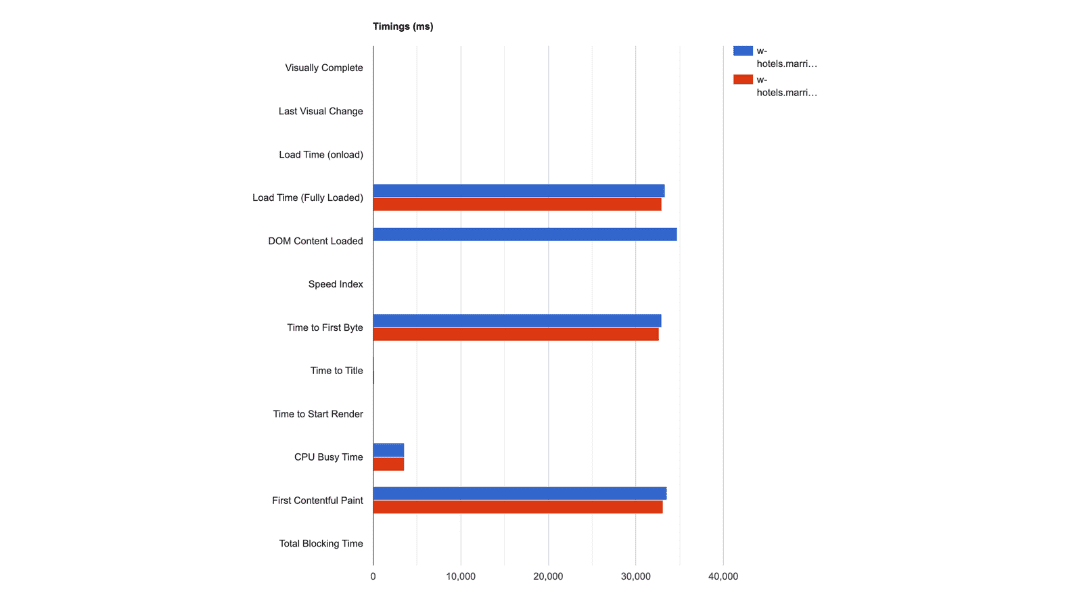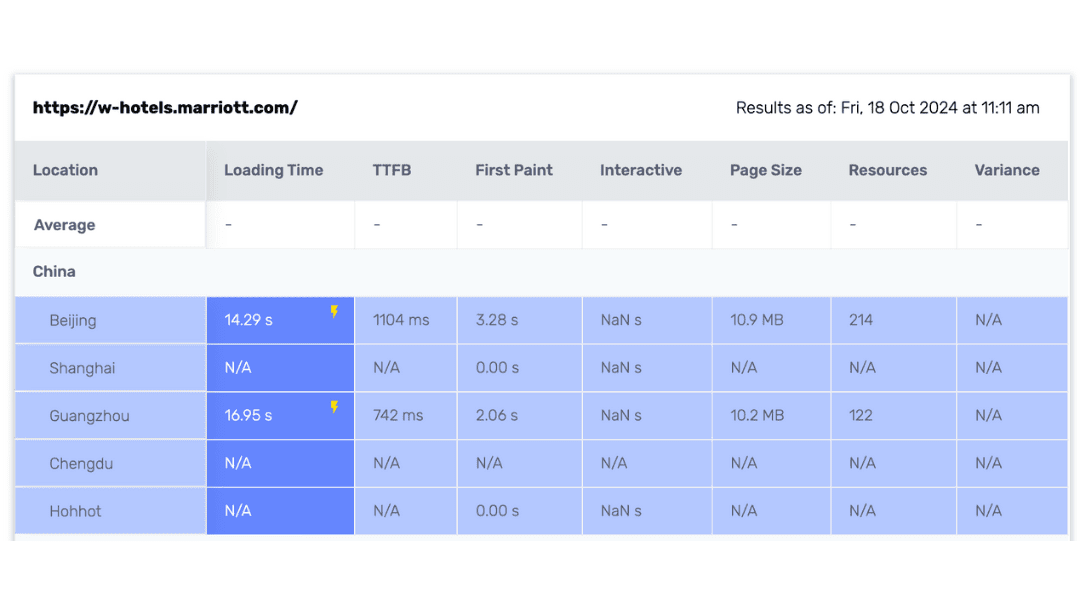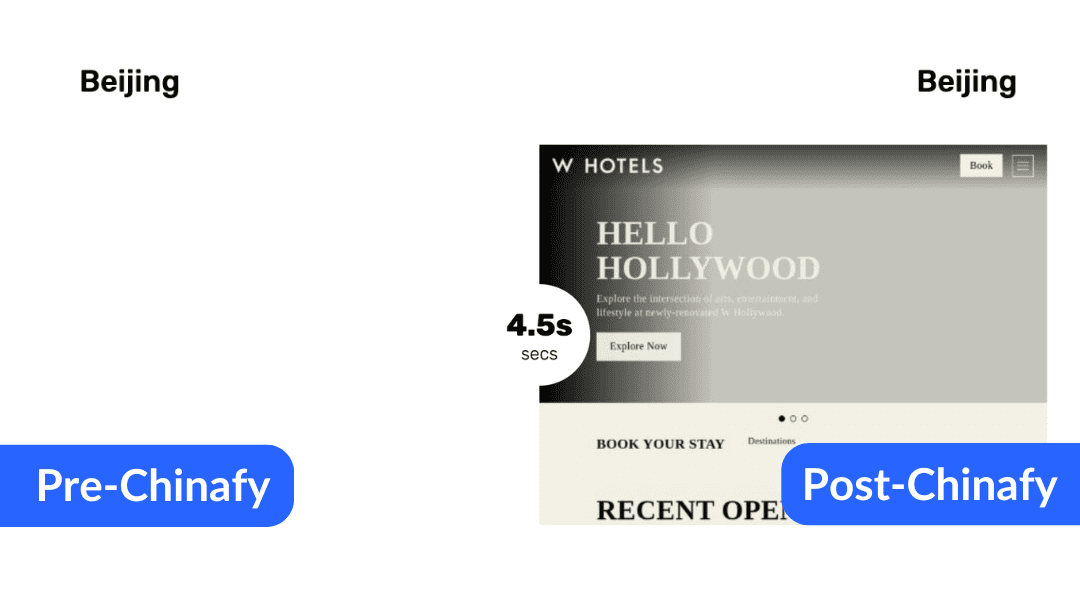1 - Expected post-Chinafy results
Why Chinese Travelers Struggle to Access Global Hotel Websites
As the world’s largest outbound tourism market, Chinese travelers play a significant role in the growth of the global travel and hospitality industry.
In 2023, around 1.1 million visitors from China arrived in the United States underscoring the importance of this market for hotels and travel-related businesses worldwide.
However, many hotels are missing out on the opportunity to directly attract Chinese travelers due to website performance issues in China. When hotel websites load slowly or fail to function properly, it leads to user frustration, missed bookings, and a reliance on third-party platforms that cut into profit margins.
So, how can hotels attract more Chinese tourists by improving their websites?
TL;DR: Hotels face significant barriers to delivering fast, functional websites in China due to third-party content restrictions and infrastructure incompatibility. By using near-China CDNs and optimizing their site with solutions like Chinafy, hotels can significantly improve site performance and attract more Chinese travelers with seamless booking experiences.
Impact of poor website performance on Chinese travelers
When hotel websites don’t load or function properly for Chinese tourists, the user experience is negatively affected. The impact can be seen in several key ways:
1. Site abandonment - Chinese travelers, like all consumers, expect fast, seamless web experiences. Research shows that 40% of users would leave a website if it takes more than 3 seconds to load. If your hotel website doesn’t load quickly for Chinese users, they’ll move on to other options that do—potentially choosing a competitor’s hotel.
2. Shift to third-party platforms - many Chinese tourists turn to local third-party booking platforms like Ctrip, Qunar, and Fliggy. These platforms often charge high commission fees to hotels, cutting into profits and preventing the opportunity for hotels to establish direct relationships with customers and offer personalized services.
3. Negative brand perception - A slow or unresponsive website leaves a negative impression. Chinese travelers may perceive your hotel as technologically outdated or indifferent to customer experience, resulting in long-term damage to your brand’s reputation. They might even choose a competitor with a more accessible website.
Common website performance issues in China
For global hotel websites, the Great Firewall of China poses significant barriers to smooth performance.
It’s not just the small hotel chains either. W Hotels owned by Marriott International, the largest hotel chain in the world, typically experiences a timeout error when loaded from Beijing, according to two test runs on webpagetest.org.

Loading metrics for two test runs of the W Hotels website on webpagetest.org
The two most common issues are:
1. Slow or blocked third-party resources
Most global hotel websites rely on third-party services, such as Google Maps, YouTube, and social media plugins to enhance their user experience. Unfortunately, many of these resources are slow or blocked in China. When a user in China tries to access a website that includes these elements, the blocked resources either delay or entirely stop the page from loading.
Common examples of third-party resources on hotel sites include:
Google Maps plugins to show hotel locations.
YouTube or Vimeo embeds for promotional videos.
TripAdvisor widgets to showcase reviews.
Live Chat services such as Intercom or Zendesk.
Advertising networks such as DoubleClick or AdRoll.
2. Limited global CDN reach
Content Delivery Networks (CDNs) that hotels use to ensure quick access for global travelers often don’t perform well in China because they lack Points of Presence (PoPs) within the region. This leads to higher latency and packet loss, resulting in a poor browsing experience.
These performance issues are not unique to hotels but are often overlooked, leading to missed opportunities.
How hotels can improve website accessibility in China
The good news is that effective solutions are available to optimize hotel websites for Chinese users. Here are some practical steps hotels can take:
1. Audit your website’s performance in China
It’s a good idea to first understand how your site currently performs in China.
Tools like Chinafy’s Global Speed Test can help you understand exactly how your website loads from within China compared to other global locations.

Chinafy Global Speed Test showing poor website performance for W Hotels in China
It’s important to run tests over time to get an accurate picture of your site’s performance. Inconsistent loading can also indicate underlying issues with third-party resources or infrastructure.
2. Use near-China CDNs
Leverage CDNs with PoPs in or near China to reduce latency for users. Popular near-China CDNs include Tencent Cloud CDN, and Akamai. This helps to improve static content delivery, but keep in mind that CDNs won’t resolve issues with blocked third-party resources.
CDNs help cache static files like images, stylesheets, and scripts closer to users, but they don't resolve dynamic content issues or blocked third-party dependencies (such as YouTube embeds). For a full solution, these elements need to be handled separately.
3. Leverage an all-in-one solution (Chinafy)
Chinafy is designed to optimize hotel websites for China without requiring you to overhaul your existing tech stack.
Chinafy addresses key challenges, including:
Third-party resources: Automatically detecting blocked or slow resources and replacing them with China-compatible alternatives.
Infrastructure issues: Enhancing content delivery by adding best-in-class near-China CDNs, even if the site is hosted offshore.
Synchronization: Ensuring the Chinafied version stays synced with your global website, minimizing ongoing maintenance.
For developers, this means seamless integration without the need for ongoing manual intervention.
4. Localize content for Chinese users
While localization isn’t going to resolve speed and functionality issues, tailoring content for Chinese travelers will make it user-friendly for this audience. This may involve translation as well as taking into account any cultural relevance or marketing messaging. If you’re working with Chinafy, we have partners who can help you with this side of your site optimization.
Case study example: How W Hotels could improve website performance in China
W Hotels faces significant website performance challenges when accessed from China, as outlined above. We evaluated the hotel’s main landing page, https://w-hotels.marriott.com, and uncovered critical issues.
Pre-Chinafy: In the first and second test run of the original W Hotel site, there were timeout errors in Beijing, meaning the site never fully loaded (only 44 of over 300 resources). In Shanghai, only 172 resources were loaded and the loading time was 38.29s.
Post-Chinafy*: After applying Chinafy optimizations, the site loaded in 9.09s in Beijing and 12.14s in Shanghai, with its first 100 resources loading in 1.49s and 1.08s respectively, which gives an indicator of how quickly the site will appear to visually load for users.
*Chinafy does not currently work with W Hotels. We have taken their landing page and applied one pass of our smart technology. This case study is not necessarily endorsed by W hotels.
This case highlights how even globally optimized websites can struggle in China. Chinafy’s optimizations improve load times and functionality without altering the core website for other regions.

Chinafy Visual Speed Test comparing the original W Hotels site (left) with the Chinafy version (right) at 4.5 seconds in Beijing.
For hotels looking to capitalize on the growing number of Chinese travelers, an accessible, fast-loading website is essential. Overcoming performance challenges such as blocked third-party resources and global infrastructure limitations will allow your business to stand out in a competitive market.
Looking to optimize your hotel’s website for a China audience? Get started with Chinafy today.



1 - Expected post-Chinafy results






























